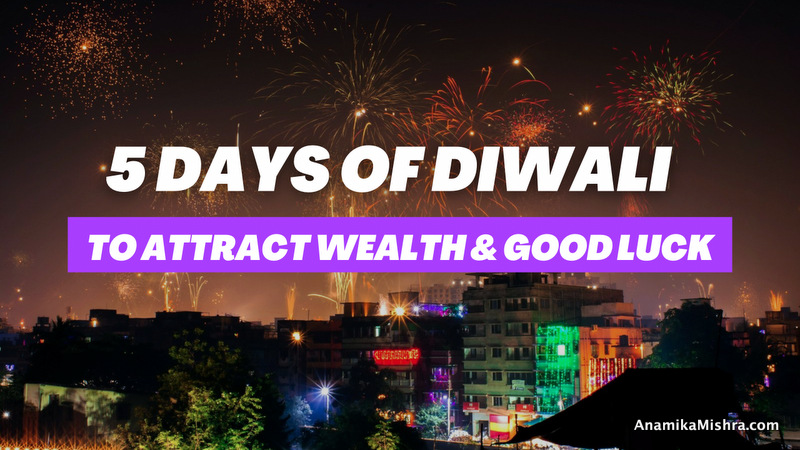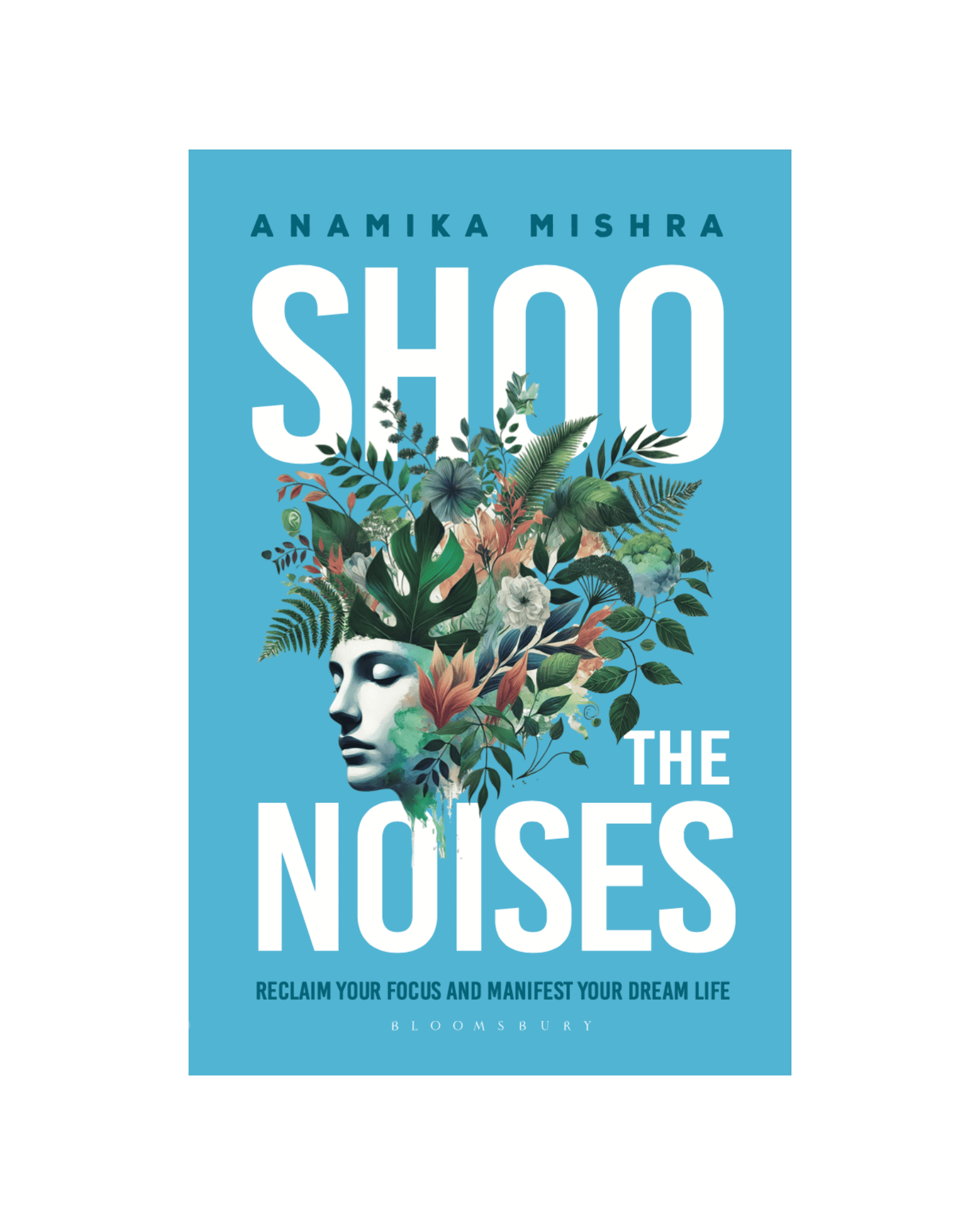Diwali is celebrated by Hindus around the world. It is also celebrated by Sikhs, Buddhists and Jains. The 5 days of Diwali are truly magical and full of festivities. Diwali is mainly celebrated to honour the return of Lord Rama back to his kingdom, Ayodhya, after an exile period of 14 years and defeating Ravana. The people of Ayodhya lit the city brilliantly and cheered Rama, Lakshman and Sita by firing crackers. Diwali is also believed to be the festival of Goddess Lakshmi returning home. Thus people rejoice by lighting up diyas around their houses. This indicates the festival of lights is celebrated to celebrate the victory of goodness over the evil and light over darkness. People pray to Goddess Lakshmi and Lord Ganesha on this day as they are assumed to bring virtuous blessing, fortune and prosperity.

Significance & Rituals for 5 days of Diwali:
Let us now discuss the significance of each day of the 5 days of Diwali and rituals that you can do to attract wealth and good luck!
1. Dhanteras
The celebrations actually commences on the very first day known as Dhanteras. On this day the goddess of wealth, Goddess Lakshmi and Lord Kubera are worshiped. Individuals believe this day to be a fortunate day to buy something valuable such as gemstones, gold, silver, new utensils and clothes. Diyas are lit outside the homes to welcome the goddess in the evening. Kubera and Laxmi are the Gods of wealth and abundance. Perform a puja ritual considering the right mahurat of the day. Also, write your money-related wish or affirmation on the piece of paper with green pen and put it near the kubera or laxmi idol in your alter. Make sure you fold it so that what’s written in it is not visible to anyone else.
2. Choti Diwali
This day comes in between Dhanteras and Diwal. Choti Diwali is also known is Naraka Chaturdasi and Roop Chaturdashi. As we are aware that on this day, Lord Krishna had defeated a demon king, Narakasur, who was the ruler of Pragjoytoshpur and had imprisoned 16,000 daughters of gods. The homes and the streets are also decorated with the gleaming lights with the day of main Diwali just being the next day.
On this day, you should not turn off the lights of your store rooms etc. and lit diyas on the drains. Also, light a diya on the tusli plant of your home to attract good luck and wealth. It is also believed that if you do the cleansing rituals in the evening at home, it also attract abundance. You can indulge in the let-go rituals as well, to clear the money blockages.
Read: Let-Go Ritual to Clear Blockages by Anamika Mishra
3. Diwali
This day is the main day of the festival. A special puja is offered to Goddess Lakshmi and Lord Ganesha in the evening during an auspicious time. Bhajans are sung and aartis are done. It is assumed that on this day goddess Lakshmi arrives home and blesses each of her devote with fortunes and wealth. The houses are decorated with the lights and even diyas are lit up. People visit their neighbours and relatives to exchange greetings and sweets. They also bursts crackers along with their families. The festival of light is the most favorable time to bring goddess Lakshmi home with the lights of Deepavali. According to the scriptures, the festival of Diwali is dedicated to Lakshmi. People clean and decorate their homes with diyas to get the her blessings.
- The first diya to be lit on the boundaries of your homes in the evening of Diwali. Goddess Lakshmi arrives home in the the form of fortune, wealth and prosperity.
- It is assumed that on the night of Diwali, Goddess Lakshmi enters into the home from the main door. And so two diyas should be kept on either side of the main door.
- On the night of Diwali, lighting lamps in the corners of the home also helps in bringing up financial benefits to the home.
- One should light up a diya where the money is kept. This helps in bringing in the general positive energy of attracting wealth.
- Clean the house in the morning and light incense sticks, sage or essential oils to clear the dead energies of the corners and attract good luck
- Keep diyas on all drains
4. Padva or Govardhan Puja
The fourth day is generally celebrated as the Govardhan Puja in the northern states of India. It is understood that Lord Krishna conquered Indra by lifting the Govardhan Mountain. People make a small mound usually with the cow dung, and worship it. In the western part of India, this day marks the New Year as per the Hindu calendar and is celebrated as Bestu Varas.
On this day, pray to Lord Krishna, the king of Dwarka to bless you with abundance. Chant Om Kleem Krishnaya Namah keeping the intention to attract abundance and wealth.
5. Bhai Dooj
The last day of the celebration is the Rakhsabandhan-equivalent for sisters is also known as Bhai Dooj. Brothers visit their sisters and perform a ’tilak’ ceremony. In this ceremony, a tilak made of rice and vermilion is applied on the brother’s forehead. Sisters pray for their brother’s long lives while the brothers promise to protect their sisters. Bhai Dooj marks the end of the celebration with pure joyfulness, warmth and beams as a festival that is notable with huge ceremony and is an illustration all over India.
Hope this article helped to understand the 5 days of Diwali and it’s significance. Remember the following points all through 5 days to maximise the effect of your puja rituals in order to attract wealth and good luck:
- Cleanliness is the key; make sure your house is neat and clean, it makes Ma Laxmi happy
- Avoid dark rooms and corners, put a light or diya in the night
- Do journaling every night – write money affirmations, wishes, miracle codes and switchwords etc.
- Light a ghee diya beneath your tulsi plant every evening
Hope this helps! Team Anamika Mishra sends you good vibes and warm wishes of the season!
Also read: 5 days of Diwali, 5 days of Diwali
Diwali Shopping Checklist – 11 Essential Things to Buy!
How To Spread The Diwali Happiness Generously?
Read my books, get from Amazon

Follow me and be a part of my amazing social media fam 😍
Facebook | Instagram | Youtube | Linkedin | Pinterest
…and don’t forget to subscribe to our FREE NEWSLETTER (check footer) to get regular updates from this blog!
5 days of diwali, five days of diwali, what are 5 days of diwali, five days of diwali, five days of diwali, 5 days of diwali



